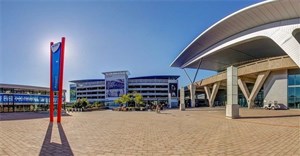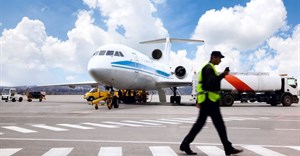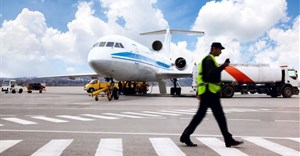Sustainability projects high on agenda as ACSA aims for carbon neutrality by 2050

As a responsible organisation, Airports Company South Africa (ACSA) has deployed an Environmental Management System (EMS) at each airport within its network. The EMS is based on the ISO 14001 Environmental Management System Standard, which is an International best practice tool.
“It is important to remember that ACSA has an important role to play in supporting the development, safety and security of our people, as well as the sustainability of the natural environment,” says ACSA Group manager for transformation Elelwani Tshikovhi.
“We have been running the EMS for about seven years across the group and every year the system is audited by external certification bodies to ensure that it is up to international standards.”
She explains that following the completion of an environmental risk assessment, significant risks are identified at each airport and planned actions are implemented, which are essentially projects designed to mitigate the identified risks. The ongoing reassessment of risks allows for the incorporation of new legislative requirements, international best practices or changes in management focus within ACSA.
One of the biggest environmental sustainability projects that ACSA is rolling out is its push to explore long-term green energy and even green fuel options, intending to become carbon neutral by 2050. In line with this, ACSA is participating in the Airports Council International’s (ACI) Airport Carbon Accreditation programme to ensure that it manages its carbon emissions optimally.
ACSA’s decarbonisation drive is already yielding results, with four of its airports – OR Tambo International Airport, Cape Town International Airport, King Shaka International Airport and Chief Dawid Stuurman International Airport – receiving certificates of accreditation last year for reducing their carbon emissions. The certificates were awarded under the Airport Carbon Accreditation programme, at the ACI – Africa World Annual General Assembly, in Morocco.
Currently, ACSA has fully operational solar farms at five of its airports, thus significantly reducing the amount of electricity it draws from the municipal grid, while also mitigating the impact of load shedding on its operations.
“There are six levels of accreditation with the Airport Carbon Accreditation programme and currently four of our airports are at level two. Level two means that we are showing a reduction in our carbon footprint year on year,” says Tshikovhi.
She adds that ACSA is aiming to attain level three by next year, which calls for stakeholder engagement in carbon reduction. This entails working with ACSA’s suppliers and service providers to encourage them to also reduce their carbon footprints.
Tshikovhi explains that in addition to its key decarbonisation project, ACSA is also engaged in several environmental management projects that focus on energy conservation, climate change mitigation, water usage, waste management, air quality, noise management and biodiversity.
“In terms of waste management, we do have waste management programmes in place at our airports. While smaller airports rely on municipal services, some of our larger airports produce sufficient volumes of waste to warrant proper recycling programmes, with dedicated waste sorting facilities,” she says.
“Obviously, all hazardous waste or spillages are disposed of correctly to ensure that no harm is done to the environment.”
In terms of noise management, aircraft noise is always a concern around larger airports and can have an adverse impact on local communities. Tshikovhi says that ACSA currently implements several noise abatement procedures, which are effectively ways of managing how aircraft operating into and out of airports to reduce noise.
On the biodiversity front, ACSA has plans in place at some of its airports to manage issues such as invasive alien plant species and urban wildlife. This is an area of focus for ACSA, with the company planning to expand its biodiversity initiatives going forward.
“In the next five years, we are probably going to focus a bit more on biodiversity. This is probably the next big thing in the pipeline for our environmental sustainability initiatives as we seek to control invasive alien plants and to drive the conservation of endangered species that occur on the airport properties,” says Tshikovhi.
She notes that with the mature implementation of an EMS across ACSA’s network, there are robust measures in place to identify the most significant environmental risks present at the airports, and there are tools in place to mitigate these risks.
“These interventions will ensure that ACSA continues on the path to the realisation of its sustainability framework while minimising its environmental impacts and striving for carbon-neutral operations,” she concludes.
- Food is a fundamental human right, yet South Africans go hungry19 Apr 16:40
- Like nutritious meals, water should be seen as an essential nutrient for learners19 Apr 11:00
- Land Bank Insurance's innovative training programme set to revolutionise agricultural sector12 Apr 15:36
- Jasco announced a continuation of its partnership with Five9 to improve customer experiences in South Africa10 Apr 14:07
- Munsoft encouraged by the R2bn budget for prepaid meter rollout to help ailing municipalities27 Feb 14:20















